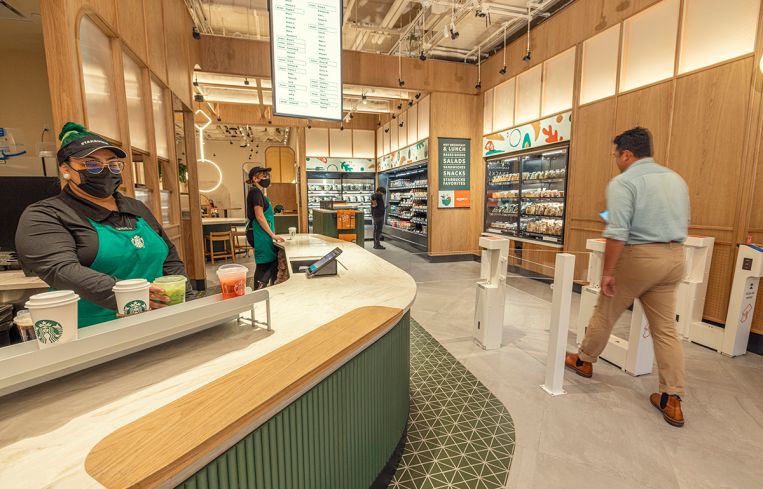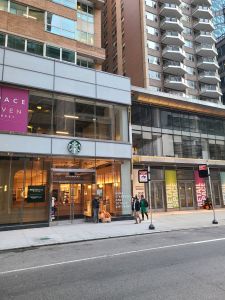Starbucks and Amazon Open Cashier-Less Coffee Shop in Midtown
Some see the partnership as a culture clash for the two brands since they have different management styles.
By Celia Young November 18, 2021 1:17 pm
reprints
Something is missing from Starbucks’ new pick-up cafe in Midtown: a cashier.
The coffee conglomerate opened a cafe on Thursday using shipping-giant Amazon’s cashier-less technology at 111 East 59th Street, between Park and Lexington avenues, in a 10-year deal. The two national companies plan to open two more similar shops over the next year, per CNBC, including another one in Midtown, in the New York Times Building at 620 Eighth Avenue, between West 40th and West 41st streets.
“Our goal with this new store concept is to give our customers the ability to choose which experience is right for them as they go through their day,” Katie Young, senior vice president of global growth and development of Starbucks, said in a statement.
The new Midtown store comes after the pandemic changed how Starbucks did business in the U.S. — closing 400 stores in 18 months and focusing on opening more pick-up locations. It’s yet another addition in Manhattan by the chain, which recently snagged 2,250 square feet for a classed-up Hudson Yards location in the ground floor of a luxury condominium building, as Commercial Observer reported.
But the new partnership with Amazon — a company widely accused of mistreating its workers — could be a culture clash for Starbucks which has previously tied its brand to supporting workers, and comes when both are facing union drives in New York, said Sam Laubach, a marketing strategist and a former Starbucks manager.
“It’s just an interesting story that they’re partnering with Amazon at the same time that they’re actively union busting in Buffalo,” Laubach told CO. “Given Amazon’s reputation with regards to how they treat their employees, their labor practices, how they are union-busting — it paints a very interesting picture that Starbucks is becoming more like Amazon.”
While he’s not sure the lack of a cashier will pose a threat to the union efforts, Laubach is concerned about the brand’s association with Amazon. Laubach worked as a shift supervisor at Starbucks for three years in Chicago and in two New York City locations, at 168th and Broadway in Washington Heights then at an express store in Columbus Circle that closed during the pandemic.
Laubach sees this partnership as Starbucks straying from its brand, which is built on supporting employees through offering health care and benefits to part-time employees, stock options and college tuition reimbursement with Arizona State University — how Laubach paid for his education.
“As a shareholder, this might work out well for me,” Laubach said. “But as someone who worked there and historically has really loved the brand and loved what they did and as someone who had their college paid for by Starbucks, I don’t love what I’m seeing in terms of the impact that will have on employees. I would rather see Amazon become more like Starbucks.”

He’s familiar with some of the issues Starbucks workers in Buffalo-area stores want a union to address, like burnout, understaffing stores and hiring mostly part-time workers to avoid giving staff breaks, but said he generally had a good work experience at Starbucks.
Workers at three separate Buffalo-area Starbucks stores filed for an election last week to join the Workers United labor union, opening the door for the first union the chain has seen in its 50-year history, The New York Times reported. The multinational chain has pushed for roughly 20 local Buffalo stores to vote in a single election — a move that would likely favor Starbucks.
Staffers in Buffalo have complained that Starbucks sent managers and senior company officials to surveil workers and transferred employees to other branches to dilute union support, which is illegal, according to the Times. Organizers filed an unfair labor practice charge accusing Starbucks of attempting to intimidate workers, while Starbucks claims the people moves were to address staffing shortages.
Amazon has a longer history with quashing attempts to form unions in its warehouses. A National Labor Relations Board (NLRB) official found in April that Amazon violated labor law by interfering in a union election in Bessemer, Ala., and recommended a do-over. Workers in a Staten Island Amazon warehouse complained of a lack of personal protective equipment during the pandemic, gender discrimination and union-busting as well, CO reported.
Union organizers in Staten Island filed for a vote in late October, but withdrew their petition 10 days before its hearing after the NLRB told them they did not have enough support to call the election. While the NLRB requires about 30 percent of employees to sign union authorization cards to call an election, organizers only had about 20 percent, The Washington Post reported. They plan to refile soon.
Amazon and Starbucks did not immediately respond to requests for further comments. RIPCO Real Estate’s Andrew Mandell represented the landlord Empire Capital Holdings in the deal. SCG Retail’s David Firestein worked on behalf of Starbucks in the transaction. He didn’t respond to requests for comment.
Celia Young can be reached at cyoung@commercialobserver.com.
With additional reporting provided by Lauren Elkies Schram.



